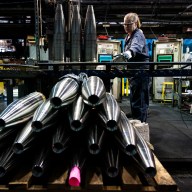OTTAWA – The fierce squabble over Martin Cauchon’s political comeback is symptomatic of a party that has lost sight of the most basic tenets of democracy, says a former national director of the Liberal party.
“We’ve turned into one big appointment society,” Sheila Gervais told The Canadian Press.
“It’s a perfect democratic deficit storm.”
The storm has been gathering for more than 25 years but reached its peak this week with Liberal Leader Michael Ignatieff’s decision to appoint a woman in the prized Montreal riding of Outremont.
The decision thwarted Cauchon’s hopes to run again in the riding he represented for 11 years until his retirement from politics in 2004. And it sparked a backlash among rank-and-file Liberals.
Ignatieff confirmed Thursday he’s now “in discussions with Mr. Cauchon to make sure he can rejoin our team.” His Quebec lieutenant, Denis Coderre, later disclosed that the former cabinet minister is being offered another Montreal riding, Jeanne-Le Ber – an offer insiders say Cauchon is unlikely to accept.
Gervais, who’s long championed democratic reform in the party, said she has “no relevant opinion” about who should be the Liberal candidate in Outremont or anywhere else. She simply believes the choice should be left strictly to grassroots members in each riding.
Instead, she said Liberals and Conservatives have been straying ever farther from that democratic ideal.
She pointed out that Ignatieff himself was not elected as leader. He was installed without a contest last December at the behest of party brass and Liberal MPs.
Most of those MPs, Gervais said, have been appointed themselves or protected for years from having to face democratic nomination challenges.
“They appoint the leader. The leader in turn appoints the election apparatus . . . . None of them have an elected basis and then these people have the right to choose and appoint candidates?” Gervais said.
“This simply has very little link to some of our most basic tenets of democracy. There is no power to the people in these types of processes.”
Gervais said the problem is “not unique to a Michael Ignatieff-led Liberal party or even to the Liberal party, frankly.”
She pointed out that Conservatives have come up with their own mechanism for protecting incumbent MPs from nomination challenges and are as adept as Liberals at manipulating the nomination process to produce the outcomes desired by party brass.
“It is my view that parties in Canada have become estranged from the electorate and that includes their own internal electorate.”
The Liberal party gave its leader the power to appoint candidates in 1992. At the time, it was argued that appointments were necessary to thwart anti-abortion activists who’d taken control of the party in some ridings.
Successive leaders have since used the power to appoint so-called star candidates, sparing them the effort of having to win nomination contests. Because appointments are almost always controversial, leaders have taken to naming primarily women candidates, justifying the appointments in the interests of gender balance.
“It is beyond unfortunate that women once again get used as the excuse for continued political machinations,” said Gervais.
















